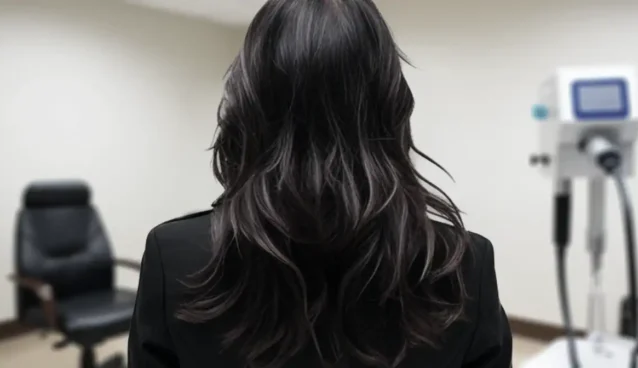ID-5

> Initializing system…
> Loading modules…
> Checking security protocols…
> System ready.
> grep “ctzn_a1245c972ba52b18aa3e85ed0d940004” -transcript -5 output
> Output:
> File not found
> done
>
Annotation: The following was pieced together from third party accounts.
Her words hung over the group with a sense of resigned finality.
A pause. Then, a slow nod.
“Come on,” the woman said. “I’ll walk you to the edge of the grid.”
Together, they rose.
They walked, heads together, speaking in hushed tones. Listening intently, nodding gently, they quietly wound their way back towards the lights.
***
She stood in the same place, in front of the reception desk, but now it was different.
Last time, they looked at her like a question mark.
This time, they looked at her like a barcode.
The ‘synch-aid’ patch on her forearm itched. She kept rubbing it, half from irritation, half from disbelief. She could still feel the heat of the injector, how it had hissed into her skin with such finality, like the sound of a door locking from the inside.
The implant wasn’t large, grain-sized, they said. Not painful. You’ll hardly notice it, they said. Except she did notice. Every second.
And now, here she was. Back at the precinct. Less than twenty four hours later. Hungry, exhausted, sore.
Captain Rios looked up from his desk when she walked in. No surprise on his face. No judgment either. Just the same flat weariness of a man who’d seen the loop repeat itself too many times to count.
“Told you,” was all he said.
She didn’t argue. Just rubbed her arm and said, “They told me I need to keep this on for twelve hours, let it bind properly.”
The captain shrugged. “Doesn’t matter. I can still scan it.”
He waved his hand over the desk panel, and a green LED pulsed on the sensor. The display bloomed in front of him, bright and fluid. Her name. Her ID. A fresh line of bio-data marked Active. Address synced. Parent ID linked. Employment: Pending. Citizenship: Probationary.
He tapped through a few panels, expression unreadable. “Probationary… Didn’t take the oath?” He glanced up at her, then back at his screen. “Podcasts,” he said, shaking his head. “Still. That all looks in order now.”
That phrase, ‘in order’, hit her in a way she didn’t expect. Cold and clean. Bureaucratic. Like a box to be ticked. Not a life.
And no, she hadn’t taken the oath.
“So that’s it?” she asked, voice low. “I’m in?”
“You’re in,” Rios said. “You’re part of the system. That’s all anyone cares about. But you should know,” he paused for emphasis, “there’s talk of making the oath mandatory.”
She exhaled, shaky. She should’ve felt relief. Instead, she felt… processed.
He slumped back in his chair and added, “Someone’ll escort you to the nursery. We’ll have to notify them this time. Explain the ID mismatch from before. Should be enough to get your kid now… but with the amount of crypto-fakes and ID forgeries floating around, it’s just easier if someone vouches in person today. Otherwise, they might flag you again for no reason at all.”
After all that hassle, still a might? The implant didn’t give her certainty. It gave her probability.
A junior officer appeared a few minutes later, silent and square-jawed, the type who didn’t ask questions. Together they stepped out into the daylight. It was raining again, not hard, just a cold mist that made the sidewalks sweat and the air smell like old metal.
She wrapped her coat tighter, feeling its accumulated dirt and wishing she had something clean. Something that didn’t scream stray. The officer didn’t speak. They just walked, side by side, down two blocks through the heart of the district. Past cafés that didn’t need cash. Past storefronts that watched you walk by. Past crowds that moved faster than they used to, eyes on their feeds, minds in their loops.
She wasn’t invisible anymore. Now she was seen. Scannable. Trackable. Permitted.
But not free.
They turned the corner, and there it was, Little Nest Nursery, soft blue facade, fake ivy-wrapped fencing, murals of cartoon birds and clouds that somehow looked worn even in digital paint. Her chest clenched. Her pace slowed.
The officer noticed.
“You okay?”
She nodded, but it wasn’t true.
I’m not okay, she thought. But my daughter will be. And I’m here.
They stepped through the gate.
And for the first time in over 24 hours, the door opened.
The moment she stepped inside her daughter saw her. The world collapsed inward, then burst outward again, full of light and movement and tears.
“Mama!”
A blur of arms and warmth collided with her legs, and she dropped to her knees before she knew she was falling. Her hands wrapped around that small frame, so warm, so solid, so real, and her breath caught in her throat as her daughter pressed her face into her shoulder.
“I missed you,” the little girl said, voice muffled.
“I missed you too, baby,” she whispered. “So much.”
Tears welled hot and fast, but she held them back, rubbing her daughter’s back in circles, grounding herself in the weight of her, proof that she wasn’t imagining, that she hadn’t lost her. Not ever, if she could help it.
“I’m sorry about yesterday,” she said to the nearest assistant, still crouched beside the rainbow-patterned welcome mat. “I—I tried. There was a mix-up…”
The assistant blinked. Young. Polite. A little confused.
“I wasn’t on duty yesterday,” she said, with a flat smile. “It’s fine. She was fed. She slept. No trouble.”
Just like that. Like it hadn’t happened at all. Like the worst day of her life didn’t even register.
She squeezed her daughter tighter.
“Where were you, mama?”
She kissed her forehead and offered a smile. “Just a… glitch.”
They walked out hand-in-hand. The drizzle had lightened, and her daughter swung her arms with that carefree rhythm only the very young could maintain.
The officer was waiting, standing straight, eyes flicking between them and the precinct in the distance.
“Ma’am,” he said, “the captain sent a data-packet. He has something for you. I’ve got another call—can you find your way?”
She nodded, her stomach twisting.
***
Captain Rios looked up as she entered, her daughter clinging lightly to her side now, unsure of the fluorescent lights and sterile smell of the station.
“You’re back,” he said, as if she’d just stepped out for lunch. He stood and reached for something behind the desk.
“Nearly forgot,” he muttered. “Couldn’t give it to you until you were registered. Only way to prove it was yours.”
He dropped it onto the counter with a soft thunk.
Her phone.
Her missing phone.
Scuffed, scratched along the edge, screen slightly cracked, but hers. The lifeline she’d lost. The spark that had set her whole world ablaze just the day before.
She stared, barely able to believe it. Her fingers hovered for a second before picking it up, as if it might vanish again.
“Cleaner found it yesterday,” Rios said, leaning back. “Turned it in like a good boy.”
Yesterday! She stiffened. Eyes on Rios. Concealed rage building behind her unmoving expression.
Rios returned a level gaze. Then, narrowing his eyes, quickly tapped a corner of his screen. “That looks like corp-issue.”
She froze.
“Means I can link your employment, if you like,” he said, already waving a hand through the air to confirm the data merge. An icon blinked green. The connection was live.
She didn’t protest.
Didn’t thank him either.
Outside, the sunlight had broken through, weak and watery. She stepped onto the pavement, still clutching the phone like it was a piece of herself returned. Stiffening. Buried rage.
Her daughter looked up, curious.
“You OK, mama?”
She forced a smile. “You’re OK. That’s what’s important.”
But as they walked, her hand clenched into a fist, causing the implant beneath her skin to throb in protest. A silent reminder: You belong now.
She looked ahead, lips pressed tight. The street felt louder now. Her phone buzzed softly with welcome messages, system pings, employer data syncs. The grid had found her again.
Her daughter was skipping, tugging her forward, back toward their apartment, the tag on her little backpack swaying side to side.
“It’s Saturday!” she sang. “What shall we do today?”
Across the street, beneath the rusted shutters of a closed bakery, the woman in the soft hooded coat stood with a grease-paper bag in one hand. Watching. Waiting.
Their eyes met. No wave. Just silent acknowledgment. The slightest nod. The corner of a smile.
Their soft conversation just hours before, as they’d walked slowly back to the grid, settled in her mind. She returned the nod, just enough.
“I don’t know baby, what do you want to do?” she exhaled, barely audible.
But her thoughts were already elsewhere.
